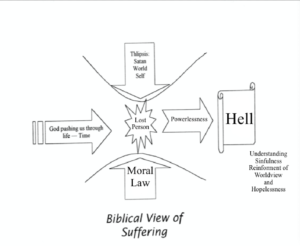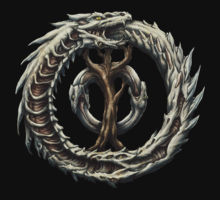
Lost Undergo Same Process to
Illustrate Their Powerlessness
In our last post, Why the Process of Suffering, I stated that the lost, those who die apart from the saving grace of Christ’s New Covenant, do not undergo the Hagiazo Process; which is true. The lost are not being made into holy ones or saints since they have not been saved by accepting Christ’s atoning death on the stauros. I further stated that they are not being punished in this life for their sin since God has given them up to live as they choose (Ro 1:18-25). However, God does have the lost undergo a similar process so they will not die in ignorance of their separation from God as He has no pleasure in the death of the lost (Ez 18:23).
God desires that people should turn from their sins and live. He would be less than loving if He did not give the lost an appreciation of their true condition: hopelessly mired in their sins and unable to extricate themselves.

The Moral Law Defines Sin
No Law: No knowledge of Sin
The Moral Law was given not to plague mankind but to warn mankind of their total depravity. Previously to the Cataclysm {Flood} God worked with all peoples. It was becoming apparent that man’s sinful nature had become so depraved that all semblance of understanding of the difference between righteousness and sinfulness was lost. Man was continually evil and knowledge of God’s truth was being eradicated (Ge 6:5-8). After the Cataclysm God began to call forth a people to carry His name in the World. It was during the process of calling the Hebrews out of Egypt and into the Wilderness that God gave His name and Law. The Hebrews were to live according to the truth of His Law so the World could understand their condition and be attracted to God and live. But, the Law was the first step of this process.
It was never the purpose of the Law to give life through adherence. The flesh would never submit to God because it could not (Ro 8:5-7; Ro 7:7-9). The Law was given so man could gain an appreciation of his sinfulness in relation to God’s righteousness. No one could keep the Law apart from God, it was His nature the Law described. Man’s fallen, fleshly nature would never be able to keep the Law. Failure to keep any part is a failure of the entire Law. Since all people are born in sin, all are under the sentence of death and already condemned by the Law (Ro 3:20; Ja 2:10).

Law’s Other Purpose: Point to Christ
Only Jesus in the Flesh Kept the Law
The flesh seeks to demonstrate its rightness by adherence to the Law; except that it does not keep the Law. The foundation of all sin is covetousness (Ja 4:1-4). Flesh wants what it should not have with these results: degradation, violence, division and death (Ro 1:18-2:5; 1Co 3:1-4). However, when compared with the Law, the flesh only demonstrates its depravity. Thus, all people are without excuse for God gives everyone understanding of their lost condition regardless of their access to the Bible. Each person’s conscience informs him or her of violation of the Law via guilty. This is the major reason that the scientism of psychology, psychoheresy, was developed; to remove the guilt of sin by rationalizing against the existence of God.
There is no temptation but such as is common to all peoples (Ec 1:9-10; 1Co 10:13). But God has made a way of escape of the ultimate consequences of sin: eternal separation from God in Jesus Christ. No one would be aware of their condition without the suffering process for the lost. The immovable anvil is the Moral Law; it is immutable as God since it embodies His character. Time is the inescapable flow by which we are moved through life. Satan, the World system and the flesh bring to bear common pressures of sin. Our sinfulness is defined by one’s success in avoiding the revelation of one’s depravity. This leads to false security that is removed once one dies (Lk 16:22-24). True success in understanding is contained in one’s failures. It is only through one’s failure to overcome that one begins to understand one’s true state of total helplessness.
True nature of salvation is that of the absolute strong one, God, reaching down to the absolutely weak one who is not only without hope or strength but totally ignorant of one’s true condition (Ro 3:10-18; 5:6). The word weak is the Greek word, ἀσθενής asthenēs. Occasionally it may mean physical sickness but usually it has the connotation of moral weakness; i.e., sin. Thus, the sinner is absolutely weak, so weak that he, or she, cannot ascertain their true condition. Like the rich man in Luke who was ignorant of his true condition because he was successful; had the illusion of strength. Lazarus the poor begger had no such illusions and threw himself on the goodness of God which he received upon his death; resting in Abraham’s bosom. This is why pride goes before a fall (Pr 16:18). Bible warns mankind that whatsoever one sows in life will be reaped in death unless one is acquitted by the righteousness of Christ in salvation (Ga 6:7).

God Would Give Life; But Satan
Only Brings Knowledge of Death
Satan had Woman and Man seek knowledge of good and evil from a tree; they discovered they were the evil without any good (Ge 3:1-7). Yet, Christ became sin for us on the tree, stauros, so that all who believe on Him will be saved (Ps 22:6-18; Jo 3:16). Thus, as one fails, like Peter, in the testings one becomes aware of one’s personal sinfulness and though many attempts at shoring up one’s sinful worldview occur a hopelessness sets in which can drive one toward repentance and salvation or despair ending in eternal death (Re 20:11-15).
If God takes the time to make you aware of your true condition, why would you blithely and blinding choose death? Because the god of this world has blinded those who believe his lie (2Th 2:9-12). Herein is the illusion of free will‘s goal: death. If God allows you to remain in your sin then you freely choose death in the mistaken belief that you are practicing freedom (Ro 6:15-19)! It is only when God overpowers your will, remove the scales from one’s eyes that one realizes the truth, cries out, “Daddy!” and is saved (Jo 6:44; Ga 4:4-7). To whom will be enslaved to: Sin leading to death; or, Christ leading to eternal life?
